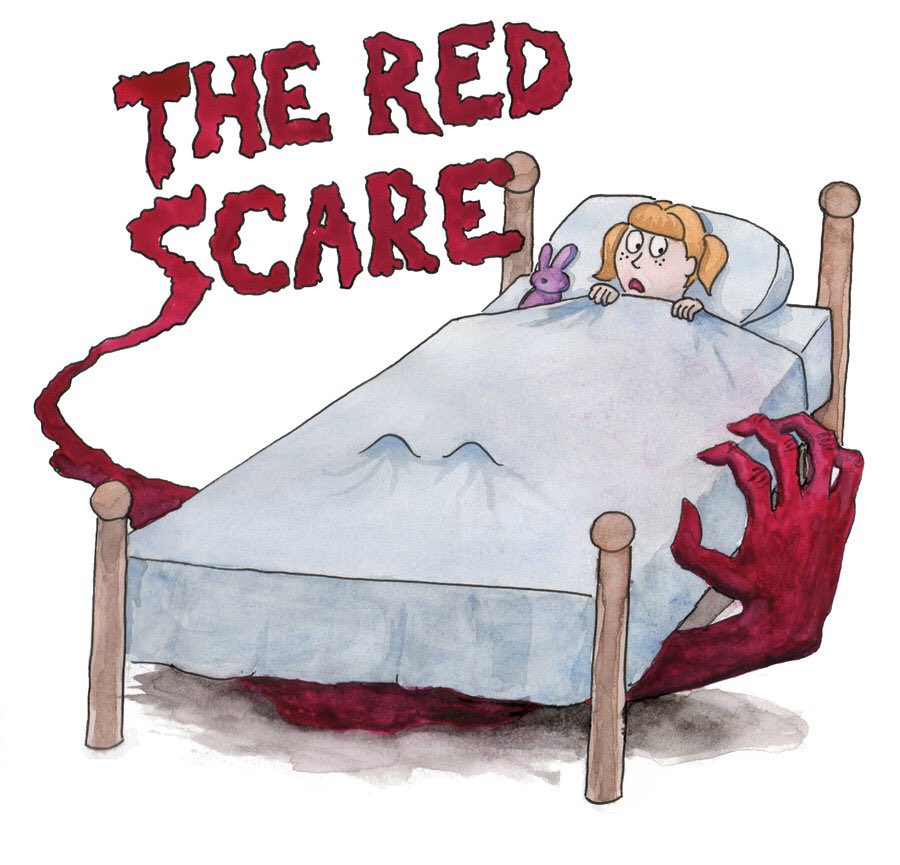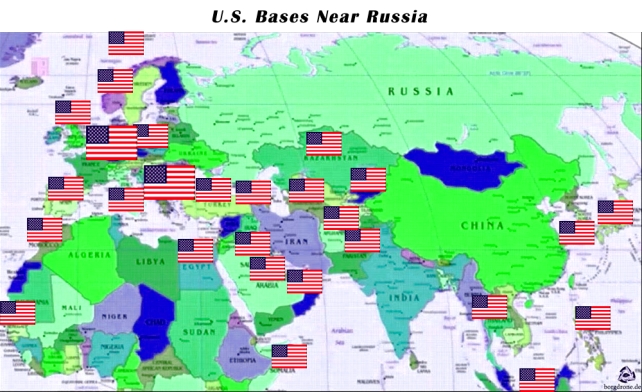By Daniel Margrain

The other day, I watched Norman Jewison’s 1966 comedy satire, The Russian’s Are Coming, The Russian’s Are Coming about the panic that ensues as a result of the forced landing of Russian submarines on a Connecticut holiday island. Released during the height of the Cold War, the film is not a particularly good one, but having spent a great deal of my adult life conditioned into believing the ‘Reds Under the Bed’ propaganda, the one thing that struck me was the extent to which Jewison portrayed the Russian’s in a positive light.
Jewison’s sympathetic portrayal was given added resonance in as much as that during the ensuing post Cold War world, Russian’s continued to be depicted, as Steven Kurutz puts it, as “Hollywood’s go-to villains”. The stereotyping of Russian’s in this way is of course premised on a real life political-based Russophobia narrative whose origins go back until at least the Napoleonic wars of the early 19th century. Propaganda against Russia was, as Ivor Neumann argued, continued by Napoleon’s former confessor, Dominique Georges-Frédéric de Pradt, who in a series of books portrayed Russia as “despotic”, “Asiatic” and “power hungry”. This was a period in which Britain had invaded Russia during the Crimean war. Craig Murray proffers some invaluable historical detail:
“As early as 1834 David Urquhart, First Secretary at the British Embassy in Constantinople, was organising a committee of “mujahideen” – as he called them – and running guns to Chechnya and Dagestan for the jihadists to fight Russia. In 1917 British troops again invaded Russia, landing at Archangel and Murmansk.”
A necessary condition to waging wars against official enemies, is the use of propaganda by the state to achieve that end. Even the influential British economist John Maynard Keynes was not averse to its power. Fifteen years after British troops landed at Archangel and Murmansk, Keynes wrote on Russia in Essays of Persuasion (pp.297-312) that the oppression in the country, rooted in the Red Revolution, perhaps was “the fruit of some beastliness in the Russian nature.”
Russia is no threat
In contrast to the historical threat to Russia from Britain, there is no evidence that the former poses a threat to the latter. Indeed, foreign and defence policy predicated on the alleged Russian threat is a British establishment concocted fantasy that has been perpetuated over time in order to justify the augmenting of the military industrial complex from which the British establishment continues to benefit financially.
Unlike the British empire, its Russian and Soviet counterparts had established their rule through the acquisition of contiguous land which ensured their hegemony over eastern Europe. Most of modern Russia that includes, for example, Dagestan and Chechnya, wasn’t the Russia of the 19th century when Britain was organising its gun running as part of the war of aggression against it.
An understanding of the historical context helps explain why Russia is fearful of Islamic instability and why Russia is concerned with the further spread of Islamic Jihad. It also partly explains why Putin got involved in Syria following Assad’s invitation in October, 2015. The existential threat Russia faces from Islamic extremism in its colonies is comparatively greater than that faced by the West.
Threat to Russia
Historically, the threat to Russia from Islamic extremists has been exacerbated by the British as part of their imperial strategy. By the 1830s the British were consciously and explicitly exploiting the Sunni-Shia divide in Afghanistan where they were playing off their support for the Shia-based communities against their Sunni counterparts during their first invasion of the country. Russia is demonised for the role it is currently playing in Syria, but the main reason it’s active in the country is to act as a counterbalance to the centuries-long determination by British imperial forces to exploit this divide as the precursor to gaining territory and thereby to attempt to dislodge Russia from land that it conquered through its own imperial endeavours.
The increase in Russophobia over the last few years that in many ways is more extreme that anything experienced during the height of the Cold War, mirrors Russia’s intervention in Crimea which was a reaction to the US-led engineered coup in Ukraine that preceded it. Overriding this is the notion that Russophobia, driven by Western fears of the Soviet role in communism’s mission to take over the “Free World”, arises periodically as a consequence of the perceived Russian threat to Western imperialist ambitions. Nothing Putin has ever said or done warrants this fear mongering. He has displayed no desire to attack the UK or the US and there is no cultural, linguistic or historical reasons why he would want to do so.
Offence not defence
Russia’s imperialist ambitions have involved the swallowing up of contiguous land rather than extraneous colonial land grabs and the eastward expansion of NATO typical of Western imperialism. The growth in the amount of US-NATO missile bases positioned around Russia which is much larger than during the period of the Cuban missile crisis, is clearly an act of provocation tantamount to aggression.
While Russia is faced with genuine potential threats from its Islamic colonies, Britain’s adversarial positioning in places like Cyprus and Bahrain serve no purpose other than as an expression of the projection of aggressive military power. In terms of the latter, the British establishment is actively supporting one of the most appalling human rights abusing regimes on earth. With its majority Shia population that rules over a tiny Sunni minority, Bahrain is a state essentially created by British imperialism underpinned by a fluid foreign policy that shifts depending on which president has been elected to the White House.
During a recent speech she made in Washington, Theresa May claimed that the days of military interventions are over. But if this were true, why would Britain need a military base in Bahrain? As Craig Murray contends, its difficult to argue in favour of the notion that Britain’s military capability is anything other than offensive:
“Britain’s forces are not configured for defence. They are configured for attack. Aircraft carriers are of no defensive use whatsoever, and indeed are hopelessly vulnerable against any sophisticated enemy. Their sole purpose today is the projection of power against poor countries. Their use lies only in the neo-con policy of attacking smaller states like Iraq, Libya and Syria. They are Blair force carriers.”
Murray continues:
“Britain is a country where thousands of children go to bed hungry. Yet is spends billion upon billion on Trident missiles whose sole purpose is to increase politicians’ sense of importance, and aircraft carriers designed to facilitate the maiming of other nations’ children. A rational, defence oriented military would have neither.”
Big business & the 2006 G8 Summit
Orwell’s famous phrase “war is not meant to be won, it is meant to be continuous”, is probably no more aptly applied than in relation to the Wests periodic war games with Russia. War is big business and the “Russian threat” is the justification by which this business is conducted. In this sense, the Cold War and Russophobia could be seen as synonymous. Putin is a Western ‘demon’ because unlike his Russian predecessors of the post- German unification period, he refuses to be seduced by the Washington consensus.
One of the more recent Cold War phases emerged in July, 2006 after Putin began reasserting Russia’s super-power status as part of the country’s first ever hosting of the G8 summit. Under Putin’s predecessor Boris Yeltsin, Russia had effectively become a vassal of the US. Putin ended that subservient status.
It was Moscow’s international independence in foreign policy, allied to its role as a gas and oil supplier, that prompted the then US vice-president, Dick Cheney, to make one of the most anti-Russian US speeches of modern times. Condemning Russia’s lack of democracy to an audience in Lithuania, Cheney proceeded on to Kazakhstan, where he praised its president whose elections are more flawed than Putin’s.
Hypocrisy
Russia’s continued trend towards the recentralisation of power in the Kremlin that began in the late 1990s under Washington’s poster boy, Yeltsin, was now depicted by the Americans as a policy trajectory defined and initiated by Putin. Western governments approved Yeltsin’s use of tanks against the Russian parliament in 1993 and his biased control of TV coverage in the 1996 elections, and yet here were the Americans criticising Russia’s faltering democracy without an apparent ability to self-reflect on their hypocrisy.
Putin’s reaction to the Cheney tirade was significant. He made only three mentions of the US in his state of the nation address a few days later, one of which was a flattering reference to Roosevelt’s new deal as a partial model for Russia. Unlike the hard power of the US under Obama, Russian foreign policy under Putin appears to be guided by soft power, which judging by the signals emanating from Trump, will be reciprocated by Washington.
Under Obama, as well as the current Conservative administration headed by Theresa May in Britain and her predecessor, David Cameron, the shift by Putin exemplified by the 2006 summit, should have been welcomed. But instead, it was seen as a new “Russian threat.” A decade on, following the unsubstantiated accusations that Russia leaked emails showing Clinton’s corruption, allegedly in order to influence the US election, Cold War anti-Russian propaganda has reached a new phase. Whatever the misgivings people have about Trump’s presidency, his attempts to reconcile US-Russian foreign policy differences must surely be welcomed.
COPYRIGHT
All original material created for this site is ©Daniel Margrain. Posts may be shared, provided full attribution is given to Daniel Margrain and Road To Somewhere Else along with a link back to this site. Using any of my writing for a commercial purpose is not permitted without my express permission. Excerpts and links, including paraphrasing, may be used, provided that full and clear credit is given to Daniel Margrain and Road To Somewhere Else with appropriate and specific direction to the original content. Unless otherwise credited, all content is the site author’s. The right of Daniel Margrain to be identified as the author of this work has been asserted by him in accordance with the Copyright, Designs and Patents Act 1988.
Make a small donation
If you’ve enjoyed reading this or another posting, please consider making a donation, no matter how small. I don’t make any money from my work, and I’m not funded. You can help continue my research and write independently.… Thanks!

